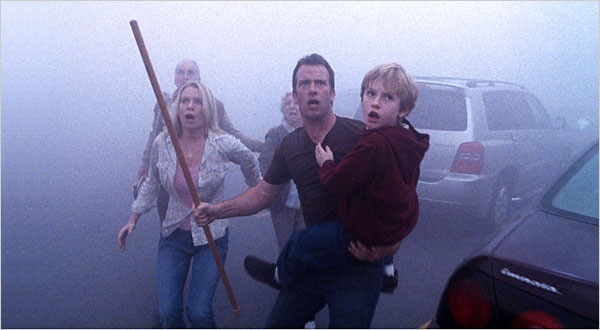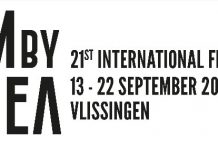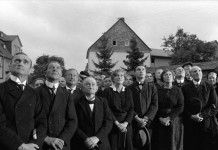“The mist is the disguise for the real story”
 Regisseur, scenarist en producent Frank Darabont heeft iets met Stephen King. Vooral als regisseur leunt zijn succes sterk op de twee fluwelen verfilmingen van The Shawshank redemption en The green mile. Voor zijn nieuwste film liet Darabont zich wederom inspireren door King maar in tegenstelling tot de beide drama’s waarvan alleen The green mile een licht fantastische inslag heeft, openbaart zich nu een volbloed horrorfilm die onder de huid kruipt. Constant Hoogenbosch had een gesprek met de man die met The mist een ijzige en welgemikte psychologische stoot uitdeelt.
Regisseur, scenarist en producent Frank Darabont heeft iets met Stephen King. Vooral als regisseur leunt zijn succes sterk op de twee fluwelen verfilmingen van The Shawshank redemption en The green mile. Voor zijn nieuwste film liet Darabont zich wederom inspireren door King maar in tegenstelling tot de beide drama’s waarvan alleen The green mile een licht fantastische inslag heeft, openbaart zich nu een volbloed horrorfilm die onder de huid kruipt. Constant Hoogenbosch had een gesprek met de man die met The mist een ijzige en welgemikte psychologische stoot uitdeelt.
CH: The Shawshank Redemption and The Green Mile were also stories written by Stephen King but different in tone and character than The Mist. Did that change or influence your approach in making the movie?
F.D.: Gosh, I think many things were different in my approach to this film. Just from the standpoint of making something very inexpensively and quickly and putting my technique, everything I’ve done prior to this aside and embracing a completely new approach as a director, visually and in pace and density. I felt very ready to shake things up and try something new. From that standpoint it was a very exciting, thrilling and liberating thing. I think as a director it’s a valuable thing to sometimes throw everything that you know of that’s done before out of the door and doing something completely different. And because the material is so dark and so edgy and because its such a difference from those other pieces I felt that this particular film was a great opportunity for me to do that.
CH: But it still is a story about people, like the earlier King films you did, isn’t it? Especially people under stress and pressure coming from intense fear.
F.D.: Yes, very much so and that’s what appealed to me. You know I love monster movies, I grew up loving the old monster movies and I love the genre. But just that would have given me no reason to really make the movie. I need that human experience, conduct and psychology to really find something to invest myself in. And this one had a very rich human story under the surface. What I love about the story, and I’m talking about the Stephen King story, is that it wasn’t just about those monsters and those fantasy elements. It’s really a study about how people fall apart under pressure…like fear…and I found that very provocative stuff.
CH: People like the character of Marcia Gay Harden in the very powerful role of Mrs Carmody? You start to hate her within the first 20 seconds of her first appearance.
F.D.: Haha, yes that’s right. I think the fact that people hate her instantly is reflected by the fact we’re all getting tired by extremists, aren’t we?
CH: Is her part a nod to religious fundamentalism and extremism that plagues the modern world of today?
 F.D.: Very much so and it was a great opportunity to be able to talk about something like that. It’s not the sort of thing you get much in a horror movie or a monster movie but that’s a great example of what I’m talking about in terms of the human element. It really does become a sociological film, a political film and why I love film as an art form is that it gives the filmmaker an opportunity to express these things. It really is a great art form of self expression.
F.D.: Very much so and it was a great opportunity to be able to talk about something like that. It’s not the sort of thing you get much in a horror movie or a monster movie but that’s a great example of what I’m talking about in terms of the human element. It really does become a sociological film, a political film and why I love film as an art form is that it gives the filmmaker an opportunity to express these things. It really is a great art form of self expression.
CH: What did you want to express in the movie?
F.D.: Well, I’ve been kind of pissed off about our conduct lately. You know in this country we have been driven by fear and unreason. And I’m really am fed up with the extremists among us. They’re affecting the rest of us. I wish they would just go away.
CH.: But unfortunately they don’t…
F.D.: No, unfortunately not…
CH: What do you think is the greater horror – the horror outside in the mist or the horror inside the supermarket?
F.D.: Definitely inside the supermarket. Nothing is more scary than how human beings can treat one another and that’s what makes this story worth telling.
CH: You made three films based on the work of Stephen King and all three of them have been successes and are critically acclaimed films – that cannot be said of all King adaptations – what is the secret for a good Stephen King adaptation?
F.D.: I think the ones that have succeeded, like Mr Cronenberg’s movie The Dead Zone or Stand by me and Misery, both by Rob Reiner, and Dolores Claiborne by Taylor Hackford, those are the filmmakers who have concentrated on what really is the secret of Stephen King’s artistic success, which again goes back to those characters. Stephen has an amazing gift for taking you on a human journey and it really does focus on the characters. The stuff around it is merely content for telling the human story. And some filmmakers forget that. Some filmmaker think it’s about the external things, the horror elements at the expense of the character elements. And those are the ones that don’t succeed. The ones I’ve named are the most successful because they really stayed with Stephen’s strengths as a writer.
CH: So Stephen King’s horror is always a means to an end?
F.D.: Exactly…and the same I would say about great science fiction. You know, you can do spaceships and robots but if it’s just that it’s not particularly interesting. It is the human element at the core. Then it becomes something potentially great and a provocative story to tell.
CH: The Mist is an old school and traditional kind of horror film that differs from the recent torture porn movies like the Saw franchise and both Hostel movies. It is a different kind of horror. What do you think of that approach?
 F.D.: Well I’m not a big fan of the torture porn thing and I was never a particularly big fan of the slasher movies back in the eighties. Because it became such a formula. Certainly as a film I love Halloween, John Carpenter’s great horror movie. But when it’s a success like that it becomes so often copied and imitated that is becomes this terrible cycle of copycat film. We’re going through the same thing right now with these torture movies which I really don’t understand. I just don’t understand the attraction of pointless cruelty. There are so many interesting stories to tell. Stephen King doesn’t like them either, by the way. He told me he’s not fond of the damn thing. I’m not particularly drawn to human cruelty. We got plenty of that in the world as it is.
F.D.: Well I’m not a big fan of the torture porn thing and I was never a particularly big fan of the slasher movies back in the eighties. Because it became such a formula. Certainly as a film I love Halloween, John Carpenter’s great horror movie. But when it’s a success like that it becomes so often copied and imitated that is becomes this terrible cycle of copycat film. We’re going through the same thing right now with these torture movies which I really don’t understand. I just don’t understand the attraction of pointless cruelty. There are so many interesting stories to tell. Stephen King doesn’t like them either, by the way. He told me he’s not fond of the damn thing. I’m not particularly drawn to human cruelty. We got plenty of that in the world as it is.
CH: Turn on the news and get your daily dose…
F.D.: Yeah, turn on the news or read a history book and you’ll get as much torture and cruelty as you want. I don’t need to watch it for entertainment.
CH: You’re working on another book adaptation right now with Fahrenheit 451.
F.D.: One of my all time favourites. One of the best stories ever…
CH: The story of course is quite different from King’s The Mist but do you have a certain method in adapting novels – what is important to you when you’re transferring the novel into a screenplay and eventually the movie.
F.D.: Honestly, my greatest focus in adapting in a piece of work is the love and respect I have for it. If I cannot find that I will not adapt it and actually that’s the first component. But I’ve always tried very hard to keep the author’s intentions in mind, to keep the tone of the author and keep the intentions of the story in mind. Because when you adapt books to screenplay there are certainly things that must change because they are two different kinds of language really, different kind of means to tell a story. So even when things change I’m still in pursuit of what the author’s intention had been. Trying to listen to the same emotions or the same feeling in the audience that the reader had reading the story. That’s my key thing. I really want it to feel that the author isn’t missing from the process once an audience watches the movie.
CH: How much freedom do you have in the translation from book to script?
F.D.: I’ve been delighted in the past by when people say that Shawshank was so faithful to Stephen King’s story. The truth is when you read the story and read the movie script you’ll see that many things actually are different but it feels like the same story. It has the same emotions and that’s the most important thing to me.
CH: You wrote the screenplay for The Mist as well and were also one of the producers – do all these functions give you more creative freedom as a director? – artistically…
F.D.: Yes, certainly…But that is not to say that I wouldn’t love to find a script I didn’t write. It would certainly lessen the workload on me but I find that the things I tend to get most excited about are the stories that speak to me. And it’s very rare I read a script that is send to me and I think ‘oh I love to make that movie.’
CH: Without giving the chilling ending away – why did you choose for the very unsettling ending for The Mist– not quite the Hollywood happy ending is it?
 F.D.: Haha, no definitely not. It’s indeed the primary reason I made the movie so inexpensively because distributors didn’t want anything to do with this. For me there are many components to the answer. For one thing, it is a horror movie and I think the intention of a horror movie is to horrify and to disturb the audience and hopefully make the audience think. Some of my favourite films in the genre like the original Night of the living dead didn’t back away and pull their punches. They took you to a very dark place in the end. Or Cronenberg’s great film The Fly or Carpenter’s The Thing, you know these movies took you to that dark place and kept you there. And for horror movies to do that successfully I think you can’t put the Hollywood happy ending to it. You want to stay true to the material and it felt to me like this material was going in this direction. If Shawshank was an examination of the positive influence of hope, than this is an examination of the negative result when hope disappears.”
F.D.: Haha, no definitely not. It’s indeed the primary reason I made the movie so inexpensively because distributors didn’t want anything to do with this. For me there are many components to the answer. For one thing, it is a horror movie and I think the intention of a horror movie is to horrify and to disturb the audience and hopefully make the audience think. Some of my favourite films in the genre like the original Night of the living dead didn’t back away and pull their punches. They took you to a very dark place in the end. Or Cronenberg’s great film The Fly or Carpenter’s The Thing, you know these movies took you to that dark place and kept you there. And for horror movies to do that successfully I think you can’t put the Hollywood happy ending to it. You want to stay true to the material and it felt to me like this material was going in this direction. If Shawshank was an examination of the positive influence of hope, than this is an examination of the negative result when hope disappears.”
CH: The ending differs from the original story. How did you come up with this ending?
F.D.: People are assuming that I made this ending up and yes I did I guess in a way, but it was really suggested by Stephen’s story. There’s a line in the last chapter, and I won’t tell you what it is because I won’t give it away, where you’re hearing David’s thoughts. And he’s actually considering the option that has been illustrated in this story, in the movie. And that’s really what sparked the idea for me. It was Stephen King’s most horrible, bleak and horrifying thought. I thought if we are going to make a Stephen King horror movie let’s follow his most horrible, bleak thought for it’s final conclusion. That’s where the ending comes from. I always knew it would be a risk and that some people would love it and some people would hate it.
CH: You delivered quite a punch with the ending…
F.D.: You’re right.. But now the movie winds up staying with people and they want to talk about it. It doesn’t leave them unaffected. And I think leaving an audience unaffected is the greatest sin a filmmaker can commit. So I’m glad that it achieved the goal that I set out for.
Constant Hoogenbosch
©Movie Machine 2008





